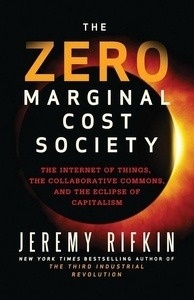The Zero Marginal Cost Society

Editorial Palgrave Macmillan
Lugar de edición
Portugal
Fecha de edición abril 2014 · Edición nº 1
Idioma inglés
EAN 9781137278463
Libro
encuadernado en tapa dura
Resumen del libro
The capitalist era is passing - not quickly, but inevitably. Rising in its wake is a new global collaborative Commons that will fundamentally transform our way of life. Ironically, capitalism's demise is not coming at the hands of hostile external forces. Rather, The Zero Marginal Cost Society argues, capitalism is a victim of its own success. Intense competition across sectors of the economy is forcing the introduction of ever newer technologies. Bestselling author Jeremy Rifkin explains that this competition is boosting productivity to its optimal point where the marginal cost of producing additional units is nearly zero, which makes the product essentially free. In turn, profits are drying up, property ownership is becoming meaningless, and an economy based on scarcity is giving way to an economy of abundance, changing the very nature of society.
Rifkin describes how hundreds of millions of people are already transferring parts of their economic lives from capitalist markets to global networked Commons. "Prosumers" are producing their own information, entertainment, green energy, and 3-D printed products at nearly zero marginal cost, and sharing them via social media sites, rentals, redistribution clubs, bartering networks, and cooperatives. Meanwhile, students are enrolling in massive open online courses (MOOCs) that also operate at near-zero marginal cost. And young social entrepreneurs are establishing ecologically sensitive businesses, crowdsourcing capital, and even creating alternative currencies in the new sharable economy. As a result, "exchange value" in the marketplace - long the bedrock of our economy - is increasingly being replaced by "use value" on the collaborative Commons.
In this new era, identity is less bound to what one owns and more to what one shares. Cooperation replaces self-interest, access trumps ownership, and networking drubs autonomy. Rifkin concludes that while capitalism will be with us for at least the next half century, albeit in an increasingly diminished role, it will no longer be the dominant paradigm. We are, Rifkin says, entering a world beyond markets where we are learning how to live together collaboratively and sustainably in an increasingly interdependent global Commons.
Biografía del autor
Jeremy Rifkin (Denver, EE. UU., 1943) es uno de los divulgadores clave de nuestros tiempos. Es el creador de la teoría de la Tercera Revolución Industrial, basada en las Tecnologías de la Información, y analiza el impacto económico, ambiental, social y cultural de las nuevas tecnologías en la economía mundial.<br> Fundador y presidente de la Fundación para el estudio de Tendencias Económicas, se licenció en Economía en la Wharton School de la Universidad de Pensilvania, donde actualmente es docente, y en Asuntos Internacionales en la Fletchen School of Law and Diplomacy de la Tufts University.<br> Ha ejercido de consejero a varios gobiernos durante sus presidencias de la Unión Europea: Francia, Alemania, Portugal y Eslovenia, entre otros. Asimismo, asesora regularmente al Parlamento Europeo en materias de medio ambiente, tecnología y seguridad energética.<br> Escribe columnas de opinión en los principales periódicos de varios países: Los Angeles Times, The Guardian, Die Süddeutsche Zeitung, El Mundo y Clarín, entre otros. <br> Ha participado en multitud de foros y conferencias en más de 200 universidades de 30 países diferentes en los últimos 30 años.<br> <br> <br> <br> <br> <br> <br> <br>








